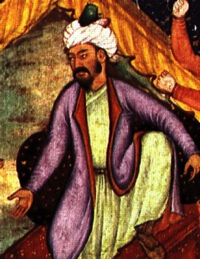Babur (Zahir-Ud-Din Muhammad)
Founder of the Mughal dynasty of India, b. 15 February 1483 (principality of Fergana), d. 26 December 1530 (Agra, India).
 Babur (Arabic: "tiger") came from the Barlas tribe of the Mongols and was therefore considered a Mughal. But he had been raised in Turkey and had taken on Turkish language and culture. He was a fifth generation descendant from Timur on his father's side and a thirteenth generation descendant from Genghis Khan on his mother's side.
Babur (Arabic: "tiger") came from the Barlas tribe of the Mongols and was therefore considered a Mughal. But he had been raised in Turkey and had taken on Turkish language and culture. He was a fifth generation descendant from Timur on his father's side and a thirteenth generation descendant from Genghis Khan on his mother's side.
Ever since Timur's empire (the region of today's Iran, Iraq, Azerbaijan, Armenia, Georgia, Afghanistan, Pakistan, parts of Russia and northern India) had collapsed soon after his death, his descendants considered themselves rulers by birth and roamed the region in the hope to establish themselves as Timur's successor. Babur's father had spent most of his life in unsuccessful attempts to take over Samarkand, Timur's old capital in Uzbekistan. Babur continued these attempts for ten years (1494 - 1504) but managed only two brief occupations.
By 1504 Babul was more or less defeated by the Uzbeks and had lost even most of his own territory. But he had the three chief qualities that characterize a successful warlord: He knew how to inspire loyalty and devotion, juggle the various factions and extract income from the peasantry and traders. He also soon proved to be a military genius. Later in the same year he and his followers took and established themselves in Kabul in Afghanistan and, after more unsuccessful attempts on Samarkand in 1511 - 1512, decided to turn east towards India.
In 1522 Babur took Qandahar. His first raids into the Punjab were successful, but insufficient knowledge of the regional politics did not allow him to establish himself. In 1525 his army of 12,000 men, including cavalry and the new technology of artillery that he had acquired from Turkey, confronted the 100,000 soldiers and 100 elephants of Delhi's sultan Ibrahim Lodi. Babur's military skill won the battle; the sultan was killed, and Babur occupied Delhi and Agra.
Throughout his life Babur did not like the Indian heat and dreamt of the Turkish lands; his first action in Agra was to establish a garden. But his future was in the east, and he used all his power of persuasion to restrain his troops from returning home in the face of increasing adversity. When he was surrounded by 100,000 men on horses and 500 elephants he promised never to drink again, broke the wine vessels and poured the wine down a well. Using cavalry raids from behind a wall of wagons he managed to drive the elephants into a stampede and emerge victorious after 10 hours.
More military action remained, but it was essentially consolidation of his first decicive achievements. By 1530 Babur had established what was to become the Mughal Empire. When his son Humayun became seriously ill and was close to death, Babur walked seven times around his bed vowing to offer his life if Humayun would live. Humayun recovered, and Babur soon declined visibly. He died within the year.
Babur's military genius had established an empire by eliminating many factions and ending much feud. But the empire needed urgent consolidation and wise management. Humayun was not up to the task and lost much of it, but Babur's grandson Akbar the Great completed what he had begun, and the Mughal Empire flourished for more than a century.
Besides his military exploits Babur was also an accomplished poet of the Turkish language, and his prose memoirs Babur-nameh are considered a world classic of autobiography. They were translated from Turki into Persian in 1589 under Akbar the Great and 350 years later, in 1921 - 1922, into English (Memoirs of Babur). They bear witness to Babur's personality as a lover of nature, adventure and good company who for his time was unusually benevolent. His love of nature is evident from a passage of his memoirs describing the panoramic view of blossoms during spring in Sindh:
- "In some places sheets of yellow flowers bloomed in plots; in others sheets of red flowers in plots; in some red and yellow bloomed together. We sat on a mound near the camp to enjoy the sight. There were flowers on all sides of the mound, yellow here, red there, as if arranged regularly to form a sextuple. On two sides there were fewer flowers but as far as the eye reached, flowers were in bloom. In spring near Parashawar the fields of flowers are very beautiful indeed."
Image: public domain (Wikipedia)
home
 Babur (Arabic: "tiger") came from the Barlas tribe of the Mongols and was therefore considered a Mughal. But he had been raised in Turkey and had taken on Turkish language and culture. He was a fifth generation descendant from Timur on his father's side and a thirteenth generation descendant from Genghis Khan on his mother's side.
Babur (Arabic: "tiger") came from the Barlas tribe of the Mongols and was therefore considered a Mughal. But he had been raised in Turkey and had taken on Turkish language and culture. He was a fifth generation descendant from Timur on his father's side and a thirteenth generation descendant from Genghis Khan on his mother's side.